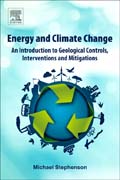
Energy and Climate Change: An Introduction to Geological Controls, Interventions and Mitigations
Stephenson, Michael
Energy and Climate Change: An Earth System Science Perspective examines the earth system science context of the formation and use of mainly fossil fuel resources, and the implications for climate change. It also examines the historical and economic trends of fossil fuel usage and the ways in which these have begun to affect the natural system (i.e., the start of the Anthropocene). Finally, the book examines the effects we might expect in the future looking at evidence from the deep time past, and looks at ways to mitigate climate change by using negative emissions technology (e.g. bioenergy and carbon capture and storage, BECCS), but also by adapting to perhaps a higher than two degree world, particularly in the most vulnerable, developing countries. In addition to geoscientists, climate scientists, environmental scientists, and students studying climate, palaeoclimate, energy and resource, geology and environmental science, Energy and Climate Change: An Earth System Science Perspective is relevant to policy makers, energy professionals, energy statisticians, energy historians and economists. Provides an overarching narrative linking earth system science with an integrated approach to energy and climate changeIncludes a unique breadth of coverage from modern to 'deep time' climate change; from resource geology to economics; from climate change mitigation to adaptation, and from the industrial revolution to the AnthropoceneReadable, accessible and well-illustrated giving the reader a clear overview of the topic INDICE: 1. Introduction to the science of the carbon cycle, fossil fuels and climate changea. The carbon cycleb. How fossil fuels are formedc. How fossil fuel formation and combustion change climate2. Natural global warming: climate change in 'deep time'a. The rock recordb. The Palaeocene-Eocene Thermal Maximumc. The end of the Younger Dryasd. The Permian-Triassic boundary3. Artificial global warming: the 'fossil economy'a. The start of the 'fossil economy': the UK, the industrial revolution and coalb. The growth of oil as a fuelc. The growth of gas as a fueld. Oil, gas and coal resource and economics, and 'unburnable' carbone. The transition of energy systems 4. The coming industrial revolution? fossil fuels and developing countriesa. Developing countries - which will use their fossil fuels and why?b. The 'Paris agreement' and the '1.5 degree world'c. Emissions reduction d. Negative emissions 5. Adapting to climate change a. Earth system science and adaptationb. Tipping points c. Developing countries are the most vulnerable: case studies in sea level rise and groundwater vulnerability6. Cycles within cycles: some conclusionsa. Earth's resilienceb. 1769 all over again?
- ISBN: 978-0-12-812021-7
- Editorial: Elsevier
- Encuadernacion: Rústica
- Páginas: 250
- Fecha Publicación: 01/05/2018
- Nº Volúmenes: 1
- Idioma: Inglés
